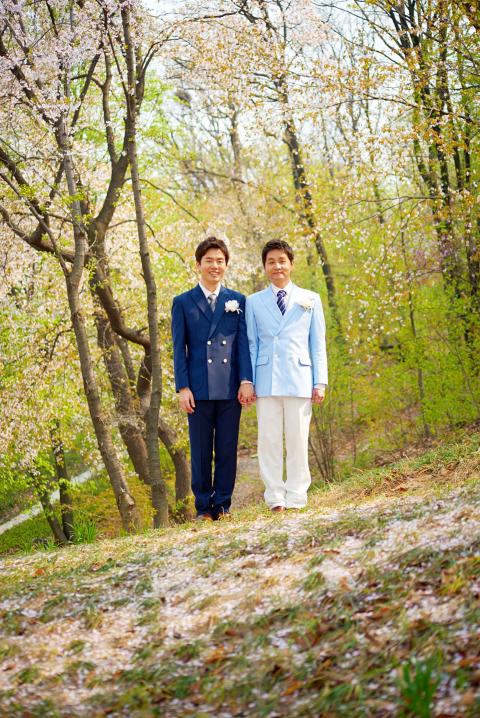Queers, sinners and Charlie Chaplin are among the characters featured in the International Queer Film Festival (台灣國際酷兒影展) and the Kaohsiung Film Festival (高雄電影節), both of which open today in Taipei and Kaohsiung.
Though only in its second year, the Queer Film Festival has ambitiously formed a pan-Asian platform to connect filmmakers, curators and other professionals throughout Asia. Family, aging, relationships, religion and HIV/AIDS are among the topics the festival explores through film.
The Kaohsiung Film Festival celebrates its 15th anniversary with the spotlight on comedy, particularly the comedies of Chaplin, who humorously tackles class consciousness and oppression.

Photo courtesy of Taiwan International Kaohsiung Film Festival
QUEER FILM FEST HIGHLIGHTS
Now in its second year, the festival, which has a lineup of close to 100 films, begins in Taipei and will then travel throughout the nation.
In I am Michael, the issue of gay rights issues is dealt with through the story of an outspoken gay rights activist, commendably played by James Franco, who denounces his homosexuality as a sin and becomes a Christian pastor.

Photo courtesy of Taiwan International Kaohsiung Film Festival
Though some say the film casts gay people in a negative light, director Lin says it presents an evenhanded portrait of a conflicted man struggling to reconcile his religion and sexuality.
Filmmaker Parvez Sharma courageously makes himself the subject of his documentary, Sinner in Mecca, to examine what it means to be gay in the Islamic world. Sharma documents his pilgrimage to Islam’s holiest site and seeks greater truth from his faith amid the politics, violence and patriarchy of Saudia Arabia, where being gay is punishable by death.
Older gay audiences may find emotional resonance in Boulevard, which stars Robin Williams as a married man whose family life unravels after he meets a young male prostitute.

Photo courtesy of Taiwan International Queer Film Festival
MAKING CONNECTIONS
This year, organizers established the Asian-Pacific Queer Film Festival Alliance. Thirteen organizations from 10 countries have joined, and festival directors from nine cities, including Seoul, Tokyo, Beijing, Yangon, Jakarta and Manila, will come to Taipei during the festival to celebrate the launch of the alliance and set up a framework for future collaboration.
Festival chairperson and co-director Jay Lin (林志杰) says the alliance allows members to pool their resources, necessary because LGBT events in Asian countries are often in need of support and funding.

Photo courtesy of Taiwan International Queer Film Festival
“Most [LGBT] movies come from the West. We would like to see more Asian stories told on the big screen,” Lin says.
Through collaboration, participating festivals can support each other with programming and international co-productions.
Lin cites the gay-themed, coming-of-age drama How to Win at Checkers, as an example.
The project began as a 10-minute documentary set in Bangkok, but later Korean-American director Josh Kim raised enough international funding to expand it to a feature-length film with an all-Thai cast.
The film has been chosen as Thailand’s submission to next year’s Academy Awards for best foreign-language film.
Lin says the aim for next year is to enable more LGBT movies to be made by Taiwanese filmmakers, a goal he hopes to achieve through workshops led by filmmakers such as Stanley Kwan (關錦鵬), Nelson Yeh (葉天倫) and Arvin Chen (陳駿霖).
“We can also use the alliance as a platform to launch all these made-in-Taiwan content to other festivals in Asia,” Lin adds.
SHORT FILMS AND IN THE CLOUD
Some of the films at the Kaohsiung festival will be available through KFF Cloud Cinema for NT$180 (雄影雲端戲院) on Google Play and the App Store, enabling users to gain access to more than 100 short films during the festival period.
Selected films include rarely seen shorts by David Lynch, German filmmaker Veit Helmer and James Cunningham from New Zealand, as well as the 66 nominated works at this year’s international short film competition.
For those who prefer the brick-and-mortar event, organizers put together a rich lineup of over 200 feature, documentary, animated and short films to be screened at three venues in the harbor city.
In addition to the four digitally restored classics by Chaplin, audiences will have a change to see past comedy gems, including Monty Python and the Holy Grail (1975), Back to the Future (1985) and The Fisher King (1991).
On the side of wacky genre flicks and B movies that the festival is known for, Japanese cult director Takashi Miike’s latest offering, Yakuza Apocalypse, combines Japanese gangster and vampire genres. Green Room is a gory thriller about a young punk rock band pitting against a gang of neo-Nazis led by a white supremacist played by Patrick Stewart.
From the documentary realm, The Wolfpack proves that truth is stranger than fiction as filmmaker Crystal Moselle reportedly spent four years following the lives of a clan of seven children, now fully grown, who were locked away by their controlling father for their entire childhood in a New York City apartment. Their only access to the outside world was through watching the 5,000 movies collected by their film-buff dad.
For this year’s music concert, which has become a highly anticipated fixture of the festival, the Kaohsiung Symphony Orchestra (高雄市交響樂團) has been invited to perform during the screenings of Chaplin’s City Lights at Da-Dong Cultural Center on Oct. 31 and Nov. 1. For more information, go to the event’s bilingual site at www.kff.tw.
FESTIVAL NOTES
WHAT: Taiwan International Queer Film Festival (台灣國際酷兒影展)
WHEN AND WHERE: Today to Nov. 1 at Taipei Shin Kong Cinemas (台北新光影城), 4F, 36, Xining S Rd, Taipei City (台北市西寧南路36號4樓), Nov. 2 to Nov. 7 at Wonderful Cinemas (萬代福影城), 38 Gongyuan Rd, Taichung City (台中市公園路38號), Nov. 13 to Nov. 22 at Oscar Digital Theatre (奧斯卡數位影城), 287 Renjhih St, Kaohsiung City (高雄市仁智街287號) and MLD Cinema (高雄MLD影城), 8 Jhongcin St, Kaohsiung City (高雄市忠勤路8號)
ADMISSION: Weekday matinee screenings (before 6pm) cost NT$160 and weeknight and weekend screenings are NT$180, NT$90 for senior citizens aged 65 and up and people with disabilities. Tickets are available through FamilyMart (全家) FamiPort kiosk and at www.famiticket.com.tw
ON THE NET: www.tiqff.com
FESTIVAL NOTES
WHAT: Kaohsiung Film Festival (高雄電影節)
WHEN: Today through Nov. 8
WHERE: Kaohsiung Film Archive (高雄市電影館), 10 Hesi Rd, Kaohsiung City (高雄市河西路10號), Da-Dong Cultural Center (大東文化藝術中心), 161 Guangyuan Rd, Kaohsiung City (高雄市光遠路161號), and Kaohsiung Main Public Library (高雄市立圖書館總館), 61 Singuang Rd, Kaohsiung City (高雄市新光路61號)
ADMISSION: Tickets are NT$180 per screening, NT$500 and NT$700 for the music concerts, available through www.ipasskhcc.tw
ON THE NET: www.kff.tw

This is the year that the demographic crisis will begin to impact people’s lives. This will create pressures on treatment and hiring of foreigners. Regardless of whatever technological breakthroughs happen, the real value will come from digesting and productively applying existing technologies in new and creative ways. INTRODUCING BASIC SERVICES BREAKDOWNS At some point soon, we will begin to witness a breakdown in basic services. Initially, it will be limited and sporadic, but the frequency and newsworthiness of the incidents will only continue to accelerate dramatically in the coming years. Here in central Taiwan, many basic services are severely understaffed, and

Jan. 5 to Jan. 11 Of the more than 3,000km of sugar railway that once criss-crossed central and southern Taiwan, just 16.1km remain in operation today. By the time Dafydd Fell began photographing the network in earnest in 1994, it was already well past its heyday. The system had been significantly cut back, leaving behind abandoned stations, rusting rolling stock and crumbling facilities. This reduction continued during the five years of his documentation, adding urgency to his task. As passenger services had already ceased by then, Fell had to wait for the sugarcane harvest season each year, which typically ran from

It’s a good thing that 2025 is over. Yes, I fully expect we will look back on the year with nostalgia, once we have experienced this year and 2027. Traditionally at New Years much discourse is devoted to discussing what happened the previous year. Let’s have a look at what didn’t happen. Many bad things did not happen. The People’s Republic of China (PRC) did not attack Taiwan. We didn’t have a massive, destructive earthquake or drought. We didn’t have a major human pandemic. No widespread unemployment or other destructive social events. Nothing serious was done about Taiwan’s swelling birth rate catastrophe.

Words of the Year are not just interesting, they are telling. They are language and attitude barometers that measure what a country sees as important. The trending vocabulary around AI last year reveals a stark divergence in what each society notices and responds to the technological shift. For the Anglosphere it’s fatigue. For China it’s ambition. For Taiwan, it’s pragmatic vigilance. In Taiwan’s annual “representative character” vote, “recall” (罷) took the top spot with over 15,000 votes, followed closely by “scam” (詐). While “recall” speaks to the island’s partisan deadlock — a year defined by legislative recall campaigns and a public exhausted